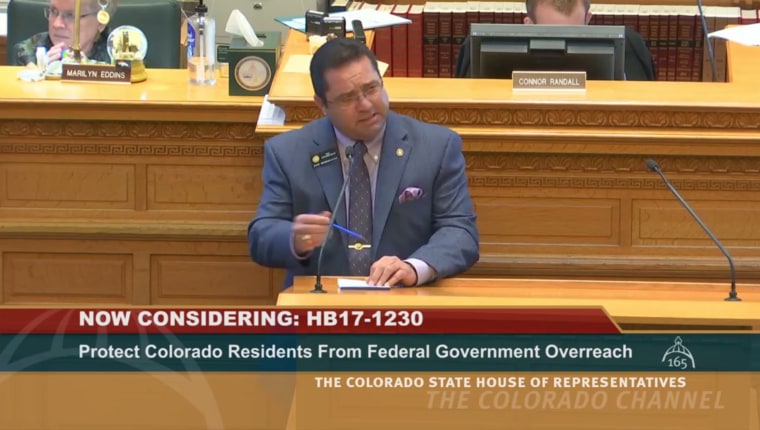The Congressional Asian Pacific American Caucus (CAPAC) lashed out Thursday at a Colorado lawmaker who some say appeared to defend the World War II incarceration of Japanese Americans while debating a bill to make Colorado a sanctuary state.
The criticism comes a day after Colorado Republican state Rep. Phil Covarrubias spoke about The Ralph Carr Freedom Defense Act in the state’s General Assembly. The bill, introduced by Democrats, seeks to protect Coloradans from what it calls federal government overreach based on race, ethnicity, national origin, or immigration status.

It was named after former Republican Colorado Gov. Ralph Carr, an opponent of Japanese-American incarceration. Some 122,000 people of Japanese ancestry were incarcerated following the signing of President Franklin D. Roosevelt’s Executive Order 9066, which authorized the relocation of anyone considered a national threat to security.
“We keep hearing about how things went down with the Japanese people,” Covarrubias said Wednesday. “For anybody that has never been in the heat of combat, when the Japanese attacked Pearl Harbor and all of that was going on, there’s no time to ask questions and find out who’s a citizen and who’s not.”
He later continued, “I hear people saying that we need to respect other people’s rights, and I agree with that. But what about them respecting our rights and our country and our laws?”
CAPAC chair U.S. Rep. Judy Chu (D-CA) called Covarrubias’ remarks unacceptable.
“It’s outrageous that we have to keep reiterating that the incarceration of Japanese Americans during World War II was wrong,” she said Thursday in a statement. “History doesn’t repeat itself because we forget. It repeats itself because apologists like Rep. Covarrubias attempt to convince us these atrocious actions were justified.
RELATED: When Japanese Americans Were Caged: 75 Years After Executive Order 9066
Covarrubias’ office did not immediately respond to an NBC News request for comment Thursday afternoon.
In an interview with the Washington Post, Covarrubias said his comments were misinterpreted.
“I guess the point I was trying to make is that, after the attack on Pearl Harbor, Roosevelt's reaction to the attack was a wrong one,” he told the newspaper.
“I stick to the fact that, under no circumstances, regardless of who they are, should people be treated in the way that people were being treated during the World War II period,” he added, according to the Washington Post. “I had nothing to do with President Roosevelt's order. I'm sorry that that was a part of our history. That's the best I can say. I have to get to a meeting.”
Colorado state legislators introduced The Ralph Carr Freedom Defense Act, known as House Bill 1230, in early March in the wake of executive orders signed by President Donald Trump. Those orders, which have been challenged in court, temporarily ban entry into the U.S. for citizens and refugees from certain Muslim-majority nations.
RELATED: Opinion: Japanese-American Incarceration Is ‘Unforgivable Policy,’ Not Precedent
House Bill 1230 bars state and local governments from providing federal authorities with the race, ethnicity, national origin, immigration status, or religious affiliation of Colorado residents, except for legal and constitutional purposes.
It also prohibits cooperation with federal authorities to create registries and to detain, track, or intern people because of race, ethnicity, national origin, immigration status, or religious affiliation. Law enforcement is, however, allowed to share information about criminals with federal agencies.
The legacy of Carr, the Colorado governor who opposed incarceration camps in his state, is remembered in the House bill that some legislators would like to see become law.
“It was not that long ago that 7,318 Coloradans—mostly American citizens of Japanese descent—were forcibly imprisoned right here in our state,” state Rep. Daneya Esgar, one of the lawmakers who introduced the bill, said in a statement on March 7. “We cannot repeat that shameful period and we must reject any attempt to create a religious registry, create internment camps, or attempt to identify individuals by their race or ethnicity.”
RELATED: Behind Barbed Wire: Remembering America’s Largest Internment Camp
Speaking in the General Assembly on Wednesday, Covarrubias offered a different view.
“I’m wondering why the need for the Ralph Carr to explain Japanese Americans,” he said. “What happened prior to that that kicked all this off? I think we were attacked in Pearl Harbor."
“I think we need to look at the Americans that are in fear from the terrorism and the things that we’ve seen over the last few years," he continued. "Everybody’s talking about the immigrants being in fear or the other people being in fear. What about our own people? What about Florida? What about San Bernardino?”
Chu, the CAPAC chair, criticized Covarrubias’ comments.
“To have an elected official justify this shameful chapter in our nation’s history in order to promote xenophobic policies today is unacceptable,” she said. “Japanese American incarceration was a violation of our nation’s values and should never be emulated again.”
The bill was slated for a third reading in Colorado’s House, where it must be approved before going to the state’s Senate.
Follow NBC Asian America on Facebook, Twitter, Instagram and Tumblr.